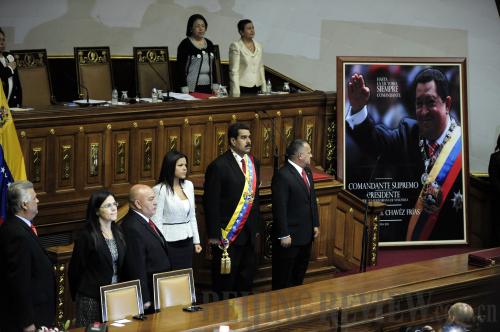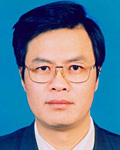|
 |
|
CARRYING ON: Venezuelan President Nicolas Maduro (second right) attends his swearing-in ceremony in Caracas, capital of Venezuela, on April 19 (XINHUA) |

As the anointed successor of late President Hugo Chavez, newly elected Venezuelan President Nicolas Maduro will likely follow in Chavez's footsteps without making major adjustments to the South American country's domestic and foreign policies.
In his inaugural speech on April 19, Maduro said, "Every day I wake up thinking about him, and I go to bed thinking about him, in need of his guidance."
The legacy of Chavez
Despite a mixed reception from the outside world, Chavez's contributions are undeniable. During his 14-year administration, Venezuela witnessed extraordinary changes in its society, politics, economy as well as diplomacy.
After Chavez took office, he swore to curb the foreign control of Venezuela's oil industry and make the rise in oil prices benefit all Venezuelans. The Chavez administration raised royalty taxes on foreign oil companies while demanding these companies transfer part of their equities to Venezuela's state-run oil company. His administration also implemented the nationalization policy in other economic sectors, thus enhancing the role of the state in the economic life of the nation, in sharp contrast to neo-liberalism.
The political power base of Chavez centered on low-income groups. Under his administration, the living conditions of low-income people improved. After taking power, Chavez carried out several poverty alleviation programs, such as providing more job opportunities for the unemployed, setting up thrift shops for the poor and building schools and hospitals in lowincome communities. With the assistance of Cuba, many people living in the remote and impoverished areas of Venezuela gained access to medical treatment and education, reducing the country's infant mortality and illiteracy rates.
Chavez aided the rise of the left-wing political force in Latin America. After Chavez won his first presidential election in 1998, many left-wing politicians assumed power in Latin American countries such as Argentina, Bolivia, Brazil, Chile, Ecuador, Nicaragua and Uruguay. "Socialism of the 21st century" advocated by Chavez is conducive to the efforts of Venezuela and other Latin American countries to explore a new path of development. The concept calls for strengthening the unity of Latin American countries and enhancing the role of the state in economic development. Though Western media denounce the political term, it has played an obvious positive role in the development of South America.
Moreover, the image of Chavez as an anti- U.S. fighter, along with the assistance provided by Venezuela to other developing countries, brought the country greater popularity and a higher status in the international community.
Challenges for Maduro
Chavez passed down enough political assets to Maduro, but the new Venezuelan president must also meet a host of economic and social challenges left over in the current society. The oil industry is the pillar of Venezuela's economy. The oil sector produces about 30 percent of GDP in Venezuela and 50 percent of the country's fiscal revenue. Oil exports account for 90 percent of the country's total export earnings, as opposed to less than 70 percent before Chavez took power. This shows that the Venezuelan economy is increasingly reliant on the oil industry, which means that once oil production drops, the country's export earnings and fiscal revenue will suffer and its economic growth could fall as well.
Venezuela's overdependence on oil has resulted in the so-called Dutch Disease—meaning too much reliance on one area at the expense of agriculture. As a result, the basic needs of Venezuela for food such as corn, rice, dairy, beef and chicken are simply not self-sufficient.
|
